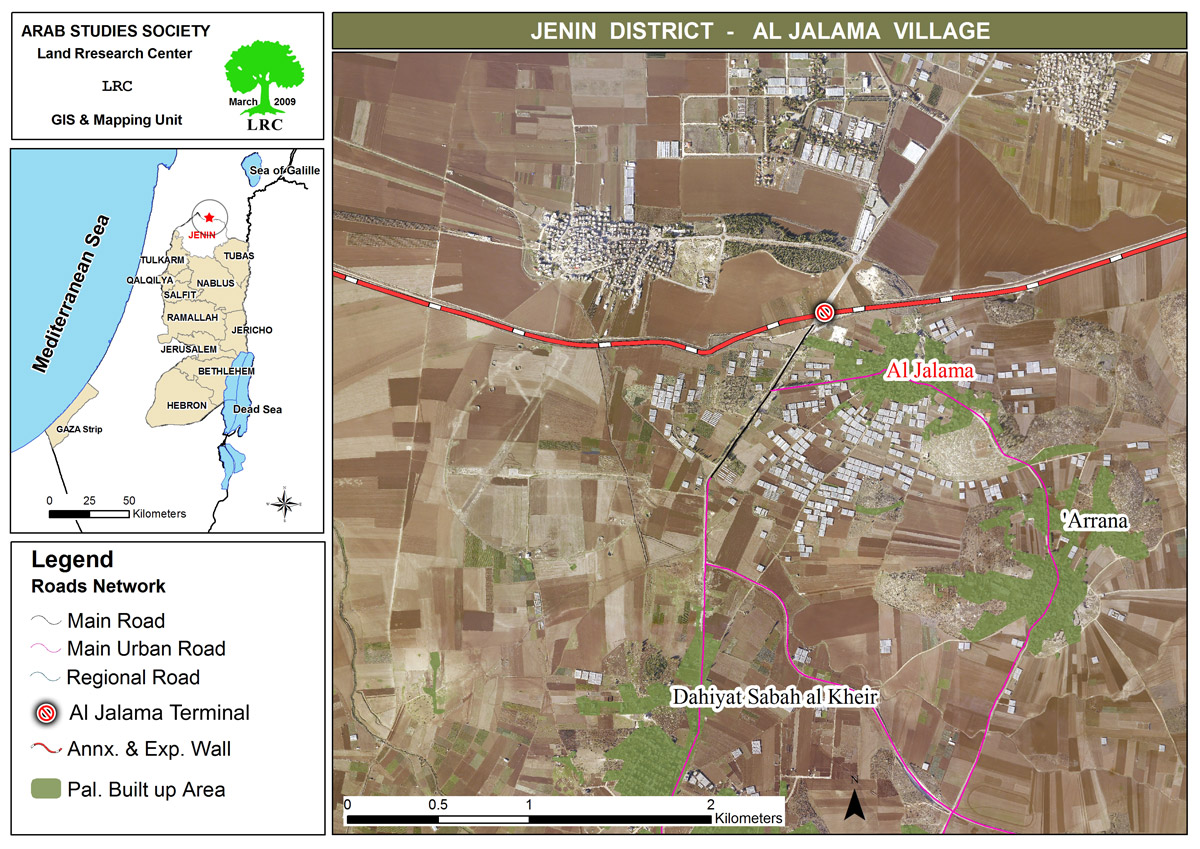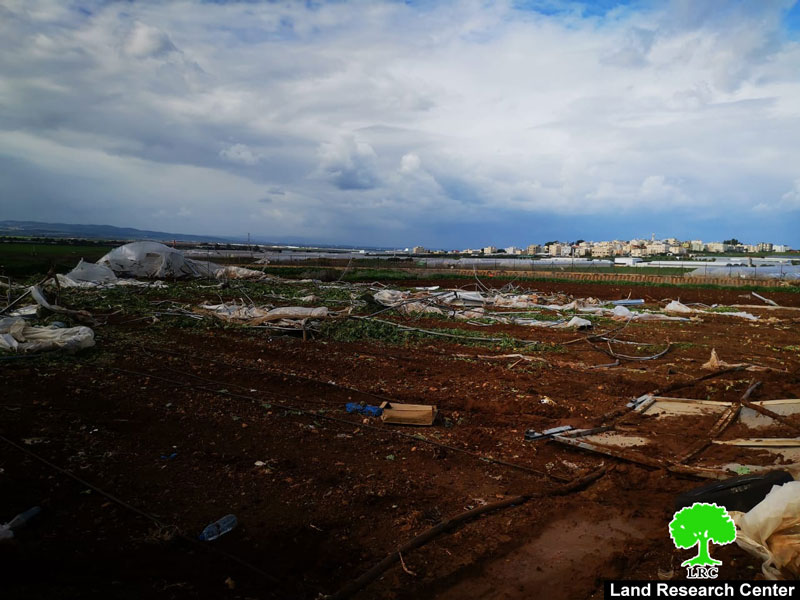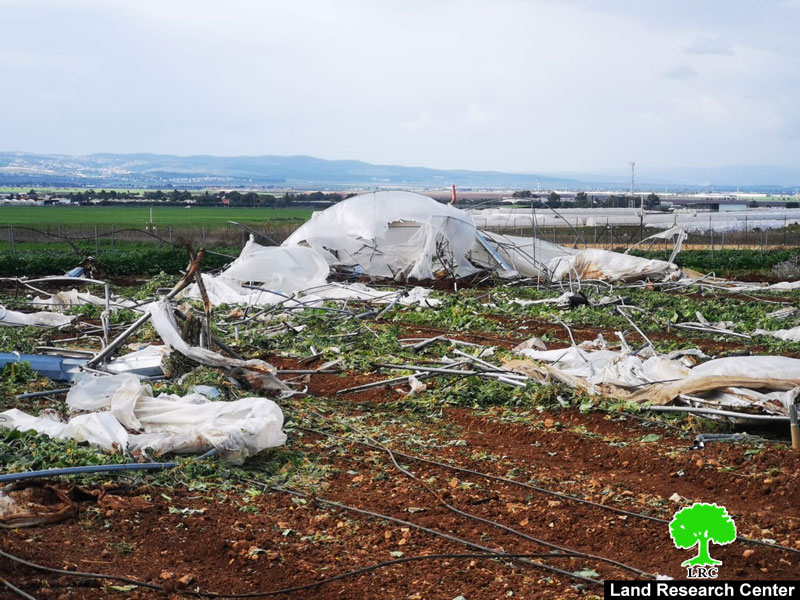The Occupation Demolishes Agricultural Greenhouses in Al-Jalama Village / Jenin Governorate
Violation: Demolition of agricultural greenhouses.
Location: Al-Jalama Village, Jenin Governorate.
Date of Violation: January 15, 2024.
Perpetrator: The so-called Israeli Civil Administration.
Affected Party: Farmer Hossam Mousa Ghoneim.
Description:
On Monday afternoon, January 15, 2024, the Israeli occupation authorities demolished six agricultural greenhouses in Al-Jalama village, located north of Jenin Governorate, under the pretext of being built without permits.
The greenhouses, which covered an area of 1,500 square meters of agricultural land, were owned by 45-year-old Hossam Mousa Ghoneim, a resident of the village. The occupation forces demolished the greenhouses, which were planted with cucumbers. Agriculture serves as the primary source of income for Ghoneim, who supports a family of nine, including four females and three children.
The Impact of Demolishing and Bulldozing Agricultural Greenhouses
It is worth noting that Mr. Ghoneim had previously received a notice to halt work and construction on the greenhouses early last year. He prepared a legal file to contest the notice, which is still under review with the Jerusalem Legal Follow-up Center. These greenhouses are among over 300 similar structures issued stop-work and demolition orders at the start of last year, allegedly for lack of permits. They are located adjacent to the separation wall built on the village's lands.
Al-Jalama Village
Al-Jalama is situated north of Jenin city, approximately 7 kilometers from the city center. It is bordered to the north by the Green Line (1948-occupied lands), to the west by the village of Al-Yamoun, to the east by Arabouna, and to the south by Arana. As of 2017, the population of Al-Jalama was 2,268.
The village is part of the municipal council of Marj Ibn Amer, which spans 65,656 dunums, with Al-Jalama’s built-up area covering 265 dunums. The council also serves other Palestinian communities, including Al-Jalama, Al-Jameelat, Um Qaboob, Barghasha, Beit Qad, Jalboun, Khirbet Abu Anqar, Deir Abu Daif, Deir Ghazala, Arana, Arabouna, Faqu’a, Beit Qad Project, and Wadi Al-Dabi’.
Al-Jalama was once known for its four artesian wells, which served as the primary source of irrigation and drinking water. These wells belonged to local residents and companies, including Salim Abu Farha, Jamal Abdul Hadi, Yassin Subh, and Abu Issa Company. Each well had a production capacity of approximately 100 cubic meters per hour. However, the occupation authorities not only seized the lands but also drained these wells, forcing residents to rely on costly water tankers, further straining their finances amid widespread poverty.
Most of Al-Jalama’s land is utilized for rain-fed field crops, with 400 dunums allocated for protected agriculture, 300 dunums for olive trees, and 350 dunums for irrigated open-field crops, according to the village council.
Historically, Al-Jalama, along with the towns of Sandala and Al-Muqaybila (occupied in 1948), shared strong social, economic, and familial ties. These towns operated as a unified community, sharing families, a single school for all children, and a single mosque. However, the Israeli occupation in 1948 severed these connections, dividing and isolating the Palestinian communities.
The occupation has confiscated 400 dunums of Al-Jalama’s lands. The bypass road No. 60 consumed 100 dunums, while the apartheid wall seized around 300 dunums under its path and isolated another 100 dunums. The wall stretches 3,500 meters across the village's lands.
Land Classification under the Oslo Accords
- Area B: 250 dunums.
- Area C: 65,406 dunums.
مشروع: حماية الحقوق البيئية الفلسطينية في مناطق "ج" SPERAC 11
Disclaimer: The views and opinions expressed in this report are those of Land Research Center and do not necessarily reflect the views or positions of the project donor; the Norwegian Refugee Council.
إخلاء المسؤولية: الآراء ووجهات النظر الواردة في هذا التقرير هي آراء ووجهات نظر مركز أبحاث الأراضي ولا تعكس بالضرورة وجهات نظر أو مواقف الجهة المانحة للمشروع؛ المجلس النرويجي. للاجئين




